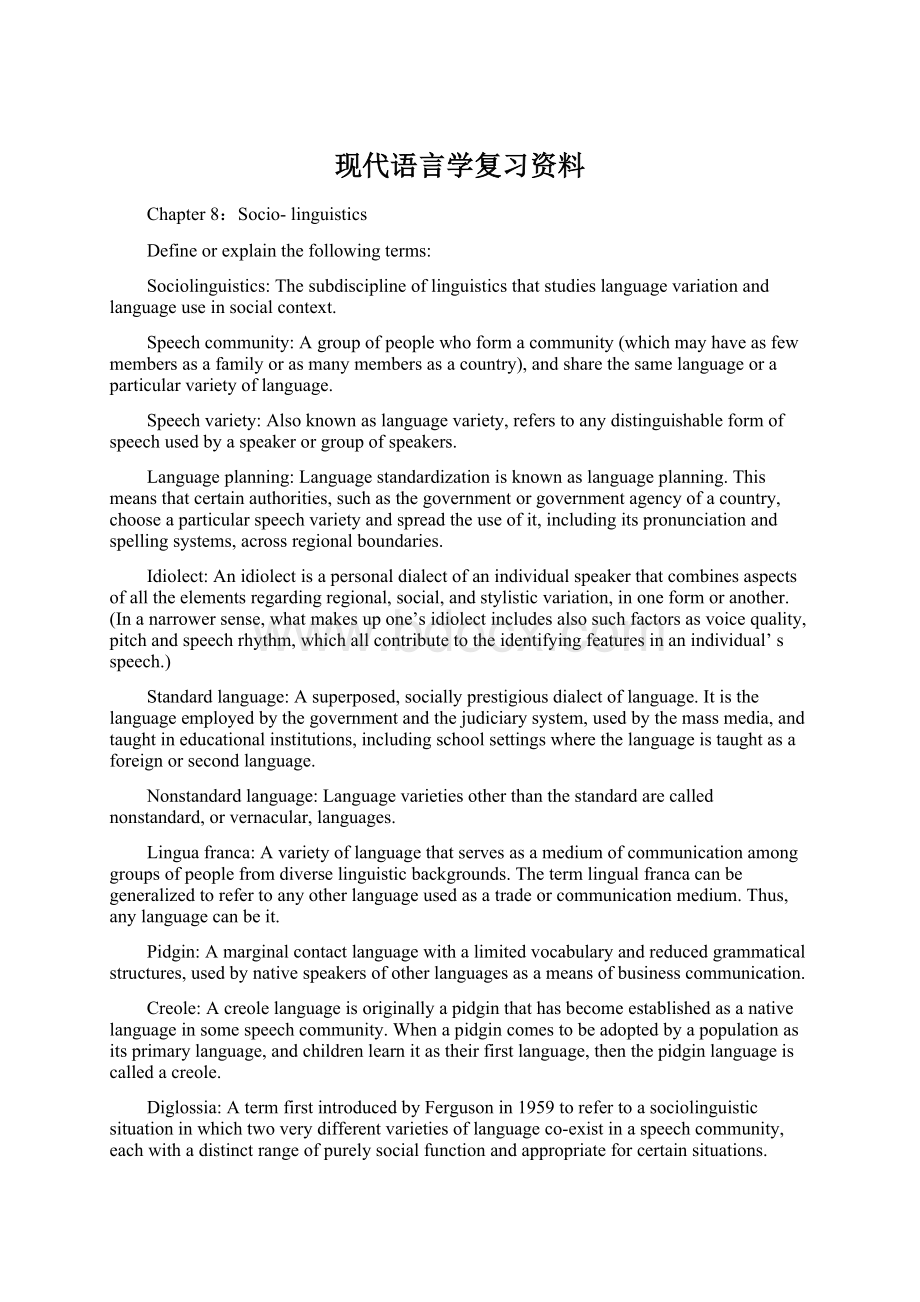现代语言学复习资料.docx
《现代语言学复习资料.docx》由会员分享,可在线阅读,更多相关《现代语言学复习资料.docx(18页珍藏版)》请在冰豆网上搜索。

现代语言学复习资料
Chapter8:
Socio-linguistics
Defineorexplainthefollowingterms:
Sociolinguistics:
Thesubdisciplineoflinguisticsthatstudieslanguagevariationandlanguageuseinsocialcontext.
Speechcommunity:
Agroupofpeoplewhoformacommunity(whichmayhaveasfewmembersasafamilyorasmanymembersasacountry),andsharethesamelanguageoraparticularvarietyoflanguage.
Speechvariety:
Alsoknownaslanguagevariety,referstoanydistinguishableformofspeechusedbyaspeakerorgroupofspeakers.
Languageplanning:
Languagestandardizationisknownaslanguageplanning.Thismeansthatcertainauthorities,suchasthegovernmentorgovernmentagencyofacountry,chooseaparticularspeechvarietyandspreadtheuseofit,includingitspronunciationandspellingsystems,acrossregionalboundaries.
Idiolect:
Anidiolectisapersonaldialectofanindividualspeakerthatcombinesaspectsofalltheelementsregardingregional,social,andstylisticvariation,inoneformoranother.(Inanarrowersense,whatmakesupone’sidiolectincludesalsosuchfactorsasvoicequality,pitchandspeechrhythm,whichallcontributetotheidentifyingfeaturesinanindividual’sspeech.)
Standardlanguage:
Asuperposed,sociallyprestigiousdialectoflanguage.Itisthelanguageemployedbythegovernmentandthejudiciarysystem,usedbythemassmedia,andtaughtineducationalinstitutions,includingschoolsettingswherethelanguageistaughtasaforeignorsecondlanguage.
Nonstandardlanguage:
Languagevarietiesotherthanthestandardarecallednonstandard,orvernacular,languages.
Linguafranca:
Avarietyoflanguagethatservesasamediumofcommunicationamonggroupsofpeoplefromdiverselinguisticbackgrounds.Thetermlingualfrancacanbegeneralizedtorefertoanyotherlanguageusedasatradeorcommunicationmedium.Thus,anylanguagecanbeit.
Pidgin:
Amarginalcontactlanguagewithalimitedvocabularyandreducedgrammaticalstructures,usedbynativespeakersofotherlanguagesasameansofbusinesscommunication.
Creole:
Acreolelanguageisoriginallyapidginthathasbecomeestablishedasanativelanguageinsomespeechcommunity.Whenapidgincomestobeadoptedbyapopulationasitsprimarylanguage,andchildrenlearnitastheirfirstlanguage,thenthepidginlanguageiscalledacreole.
Diglossia:
AtermfirstintroducedbyFergusonin1959torefertoasociolinguisticsituationinwhichtwoverydifferentvarietiesoflanguageco-existinaspeechcommunity,eachwithadistinctrangeofpurelysocialfunctionandappropriateforcertainsituations.
Bilingualism:
Bilingualismreferstoalinguisticsituationinwhichtwostandardlanguagesareusedeitherbyanindividualorbyagroupofspeakers,suchastheinhabitantsofaparticularregionoranation.Therearebilingualcommunitiesinwhichtheirmemberscommonlyusetwolanguagesintheirdailylives.
Domain使用域:
Domainreferstothephenomenonthatmostbilingualcommunitieshaveonethingincommon,thatis,afairlyclearfunctionaldifferentiationofthetwolanguagesinrespectofspeechsituations.Forexample:
theHomeDomain,EmploymentDomainetc.
Code-switching:
Abilingualspeakeroftenusestwolanguagesalternativelyduringaconversationwithanotherbilingualspeaker,aspeechsituationknownascode-switching.
Ethnicdialect:
Anethniclanguagevarietyisasocialdialectofalanguage,oftencuttingacrossregionaldifferences.Anethnicdialectisspokenmainlybyalessprivilegedpopulationthathasexperiencedsomeformofsocialisolation,suchasracialdiscriminationorsegregation.
Socialdialects(orsociolects):
Varietiesoflanguageusedbypeoplebelongingtoparticularsocialclasses.
Register:
Registersarelanguagevarietiesappropriateforuseinparticularspeechsituations,incontrasttolanguagevarietiesthatareassociatedwiththesocialorregionalgroupingoftheircustomaryusers.Forthatreason,registersarealsoknownassituationaldialects.
Addressterm:
Anaddressterm,oraddressform,referstothewordorwordsusedtoaddresssomebodyinspeechorwriting.
Slang:
Slangisacasualuseoflanguagethatconsistsofexpressivebutnonstandardvocabulary,typicallyofarbitrary,flashyandoftenephemeralcoinagesandfiguresofspeechcharacterizedbyspontaneityandsometimesbyraciness.
Linguistictaboo:
Referstoawordorexpressionthatisprohibitedbythe“polite”societyfromgeneraluse.Obscene,profane,orswearwordsarealltaboowordsthataretobeavoidedentirely,oratleastavoidedinmixedcompany.
Euphemism:
Aeuphemismisamild,indirect,orlessoffensivewordorexpressionsubstitutedwhenthespeakerorwriterfearsmoredirectwordingmightbeharsh,unpleasantlydirect,oroffensive.Forexample,wesay“portly”insteadof“fat”.Inmanycultures,peopleavoidusingdirectwordsthatpertaintodeathordying.
Whatarethedistinctionsbetweenbilingualismanddiglossia?
Bilingualismreferstoalinguisticsituationinwhichtwostandardlanguagesareusedinaspeechcommunity;whereasinadiglossiccommunity,twovarietiesoflanguageareusedfordifferentsituations,onebeingmorestandardandhigher,andusedformoreformalmatters,andtheotherlessprestigious,andusedforcolloquialsituations.
DiscusswithexamplessomeofthelinguisticdifferencesbetweenStandardEnglishandBlackEnglish.(featuresofBlackEnglish)
OneofthemostprominentphonologicalcharacteristicsofBlackEnglishisthefrequentsimplificationofconsonantclustersattheendofwordswhenoneofthetwoconsonantsisanalveolar/t/,/d/,/s/,or/z/.Theapplicationofthissimplificationrulemaydeletethepast-tensemorpheme,so“past“and“passed“arebothpronouncedlike“pass.”
AnothersalientcharacteristicofBlackEnglishphonologicalsystemconcernsthedeletionofsomeword-finalstopconsonantsinwordslike“side”and“borrowed.”SpeakersofBlackEnglishfrequentlydeletetheseword-finalstops,pronouncing“side”like“sigh”and“borrowed”like“borrow.”
Oneprominentsyntacticfeatureisthefrequentabsenceofvariousformsofthecopula“be”inBlackEnglish,whicharerequiredofStandardEnglish.ComparethefollowingexpressionsinBlackEnglishandStandardEnglish:
(1)BlackEnglishStandardEnglish
Theymine.They’remine.
Youcrazy.Yourecrazy.
AnotherdistinctivesyntacticfeatureofBlackEnglishisthesystematicuseoftheexpression“itis”whereStandardEnglishuses“thereis”inthesenseof“thereexists”:
IsitaMr.Johnsoninthisoffice?
AnotheraspectofBlackEnglishistheuseofdoublenegationconstructions.Whenevertheverbisnegated,theindefinitepronouns“something”,“somebody”,and“some”becomethenegativeindefinites“nothing”,“nobody”,and“none”,forexample:
Hedon’tknownothing.(Hedoesn’tknowanything.)
Listseveralwaysinwhichthespeechofwomenandthespeechofmendifferfromeachother.(理解)
Womentendtousemoreprestigiousforms,morepoliteandindirectlanguage,andmorespecificcolortermsthantheirmalecounterparts.Femalesarefoundtousemorequestionsthandeclarativestatementsincomparisonwithmales.
展开:
1)Innormalsituations,femalespeakerstendtousemoreprestigiousformsthantheirmalecounterpartswiththesamegeneralsocialbackground.Forexample,standardEnglishformssuchas“Ididit”and“heisn’t”canbefoundmoreofteninthespeechoffemales,whilethemorecolloquial“Idoneit”and“heain’t”occurmorefrequentlyinthespeechofmales.
2)Anotherfeatureoftenassociatedwithso-calledwomen’slanguageispoliteness.Usually,toughandroughspeecheshaveconnotationsofmasculinityandarenotconsideredtobedesirablefemininequalities.Ingeneral,men’slanguageismorestraightforward,lesspolite,andmoredirect,andwomen’slanguageismoreindirect,lessblunt,andmorecircumlocutory.
3)Thisphenomenonofsex-preferentialdifferentiationisalsoreflectedintherelativefrequencywithwhichmalesandfemalesusethesamelexicalitems.Forexample,certainwordsthatarecloselyassociatedwithwomenmaysoundtypicallyfeminineasaresultofthatassociation.Forexample,someEnglishadjectiveslike“lovely”,”nice”,”darling”and“cute”occurmoreofteninfemalespeechesandthereforecausefeminineassociation.
4)Femaleshavealsobeenshowntopossessagreatervarietyofspecificcolortermsthanmales,inspiteofthefactthatmendonotnecessarilypossesslessacutecolorperceptionthanwomen.Ontheotherhand,maleshavethereputationofpossessingalargervocabularyintraditionallymale-dominateddomainssuchassports,huntingandthemilitary.
5)Sex-preferentialdifferentiationisalsoseeninthespeechactsofmalesandfemales.ArequestinEnglishsuchas“Closethedoorwhenyouleave”canbephrasedinanumberofwaysrangingfromaharshcommandtoaverypoliterequest:
a.Closethedoorwhenyouleave.
b.Pleaseclosethedoorwhenyouleave.
c.Wouldyoupleaseclosethedoorwhenyouleave?
d.Couldyouclosethedoorwhenyouleave?
Althoughtheaboveoptionsareallavailabletobothmenandwomen,itisusuallythemorepoliteformsthatareselectedbyfemalespeakers.Ingeneral,femalesarefoundtousemorequestionsthandeclarativestatementsincomparisonwithmales.
Thefollowingwordsareconsideredinstances(实例)ofsexistlanguage.Findalternativestothesemasculine-markedwords:
businessman→businessexecutive
cleaningwoman→housekeeper
forefather→ancestorhousewife→homemaker
kinsman→relativelayman→nonspecialist
spokesman→speaker,representative
statesman→leaderstewardess→flightattendant
workmanship→skilledjob,qualityjob
mankind→peoplemanp